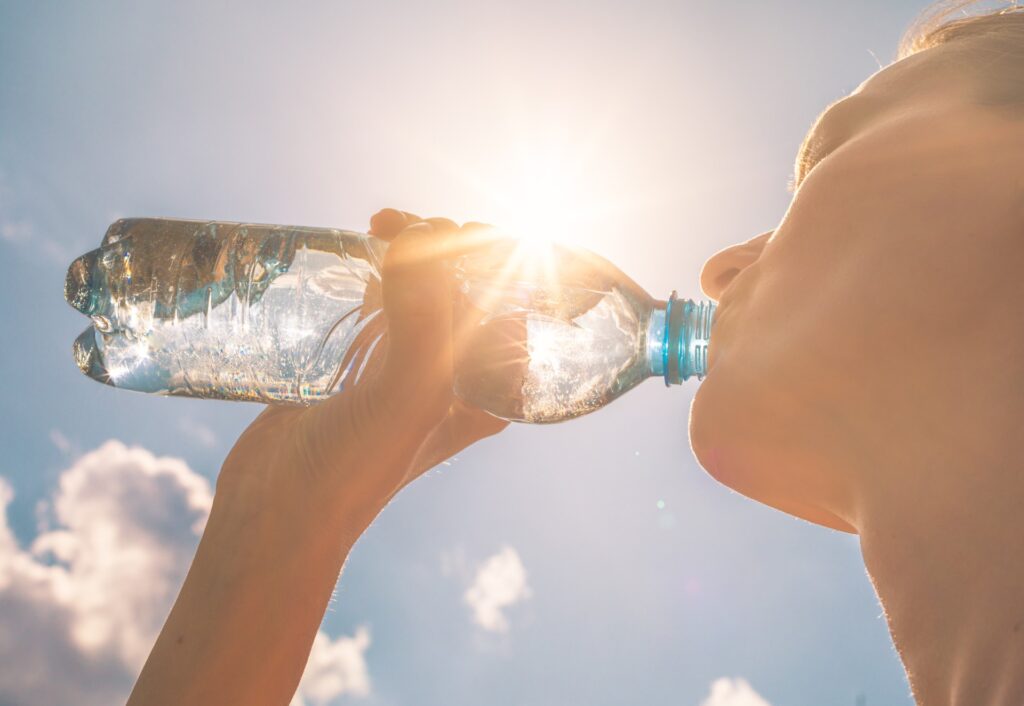Tips to avoid heat exhaustion, heatstroke
AgriLife Extension experts warn outdoor activity requires greater precautions in heat
As summer temperatures increase, so does the threat of a heat-related illness. To help reduce this risk, Texas A&M AgriLife Extension Service experts offer tips on how to keep your cool and stay safe in the heat.
“Heat exhaustion can occur when the body heats up faster than its ability to cool down,” said Mike Lopez, DrPH, AgriLife Extension specialist in family and community health, Bryan-College Station. “It is the body’s response to excessive loss of water and salt, which can cause symptoms like heavy sweating, faintness, dizziness, fatigue, rapid pulse, headache and nausea.”
Heat exhaustion, heatstroke can be serious

Without prompt treatment, Lopez said heat exhaustion can lead to heatstroke, a life-threatening condition. Heatstroke occurs when the body reaches a temperature of 104 degrees or higher.
“Some symptoms of heatstroke are confusion, altered speech, nausea or vomiting, rapid breathing, and a racing heartbeat,” he said. “We recommend everyone, especially if they are at a high-risk for heat-related illness, be aware of the symptoms of heat stress, especially heat exhaustion and heatstroke.”
Heatstroke requires emergency treatment. Left untreated, it can quickly damage your brain, heart, kidneys and muscles. The damage worsens the longer treatment is delayed, increasing your risk of serious complications or death.
“The body naturally heats up during outdoor activity but normally keeps itself cool by sweating,” said Debra Kellstedt, DrPH, AgriLife Extension specialist, Bryan-College Station. “But sometimes the body is not able to cool itself off adequately and this greatly increases the risk of heat-related illness. However, there are some actions you can take to stave off the most dangerous and debilitating effects of prolonged heat exposure.”
Here are some precautions these and other experts offer for anyone headed outside during the hottest months of the year:
Pace yourself and reduce activity during the hottest parts of the day
Avoid strenuous activity in hot weather. Drink plenty of fluids and rest frequently in a shady or cool spot. Be mindful of the heat index and schedule more intense physical activities for the morning or evening.
Get acclimated to the heat
Limit the amount of time spent working or being active in the heat until you’re conditioned to it. This is especially important for people not used to hot weather.
Wear loose-fitting, lightweight clothing
Your body doesn’t cool properly when wearing excess clothing or clothing that fits tightly. Quickly cool down by drenching clothing with cool water.
Protect against sunburn
Protect yourself outdoors with a wide-brimmed hat, sunglasses and sunscreen because sunburn can reduce the body’s ability to cool. Protect your skin using an SPF 30 or greater sunscreen applied generously. Reapply every few hours afterward, especially if you are swimming or sweating a lot.
Drink plenty of fluids
Stay hydrated to help your body sweat and maintain body temperature. During outdoor activity or work, keep a drink with electrolytes handy to help replenish fluids, salt and other substances lost through sweating.
Take extra precautions with certain medications
If you take medications, ask your doctor or a health care professional if their side effects might affect your ability to stay hydrated and/or dissipate heat.
Never leave children, impaired adults or pets unattended in hot vehicles
About 40 children under the age of 15 die annually from being left unattended in a vehicle. Never leave a person or pet in a parked car in warm or hot weather, even if the windows are cracked or the car is in the shade. Keep your car locked and the keys in a secure location to prevent children from getting inside when it is parked
Be extra cautious if you’re at increased risk for heatstroke
If you have a condition that increases your risk of heat-related problems, avoid the heat as much as possible and act quickly if you notice symptoms of overheating. Those engaged in a sport or other strenuous activity in hot weather should be aware of the signs of heat exhaustion and heat stroke and be sure medical services are readily available in case of a heat-related emergency.
“Summer should be a time for having outdoor fun and enjoying the warmer weather,” Kellstedt said. “But you need to listen to your body when it tells you it’s too hot and take the necessary precautions to reduce the risk of heat exhaustion or heatstroke.”


